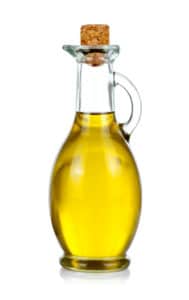By Anne Palumbo
 I don’t know about you, but I was raised on vegetable oil. Pale in color and neutral in flavor, it found its way into every dish or baked good that needed oil. Once out of the nest, it’s the oil I habitually reached for when I started cooking.
I don’t know about you, but I was raised on vegetable oil. Pale in color and neutral in flavor, it found its way into every dish or baked good that needed oil. Once out of the nest, it’s the oil I habitually reached for when I started cooking.
But then, for nutritional reasons, I switched over to canola oil. Although canola oil and vegetable oil are both plant-based oils, they differ in their fat composition: canola oil is lower in saturated fat and richer in healthy fats.
These days, however, my heart and hearth belong to olive oil — primarily the extra-virgin type referred to as EVOO.
Ever since I read that people tend to live longer and healthier lives in regions where olive oil is a staple part of the diet, I decided to embrace one of the world’s healthiest oils.
What makes olive oil so good for you? It’s rich in two important nutrients: heart-healthy unsaturated fats and disease-thwarting antioxidants. What makes EVOO particularly good? Because it’s less refined than regular olive oil, it’s notably higher in both.
According to the American Heart Association, unsaturated fats — which include monounsaturated and polyunsaturated fats — can reduce the risk of heart disease and stroke by helping to lower bad cholesterol levels in your blood. When you choose to eat healthy fats over unhealthy fats (i.e., saturated and trans fats), you are doing your body good! Olive oil is especially high in monounsaturated fats, quite low in saturated fat, and has no trans fats.
 Olive oil stands apart from most oils because it boasts a unique and abundant combination of beneficial antioxidants. Antioxidants protect our body from disease and accelerated aging by gobbling up harmful free radicals — byproducts of the oxidation process that can turn good cells bad.
Olive oil stands apart from most oils because it boasts a unique and abundant combination of beneficial antioxidants. Antioxidants protect our body from disease and accelerated aging by gobbling up harmful free radicals — byproducts of the oxidation process that can turn good cells bad.
Worried about chronic inflammation? Olive oil may be your ticket to quieting the painful and often destructive fire within. Research has shown that olive oil contains two nutrients that can fight inflammation: oleocanthal (an antioxidant) and oleic acid (an unsaturated fatty acid). Chronic inflammation is believed to be among the leading drivers of many diseases, including cancer, heart disease, Alzheimer’s, diabetes and arthritis.
Like most oils, olive oil contains about 120 calories per tablespoon. While it’s one of the healthier oil choices, it’s still high in calories compared to actual vegetables. Experts recommend that we use olive oil in moderation and in place of overly processed oils and butter, not with them.
Mixed Greens with Favorite Vinaigrette
2 tablespoons red wine vinegar
2 tablespoons fresh lemon juice
1/2 teaspoon salt
1/4 teaspoon coarse black pepper
1 1/2 tablespoons minced shallots (or 2 cloves garlic, minced)
2 teaspoons Dijon mustard
1/2 teaspoon sugar
1/3 cup olive oil
Salad greens of choice
In a small bowl, whisk everything together but the olive oil. Slowly whisk in the olive oil until well blended. Use immediately or store in the refrigerator for up to two weeks.
Place the greens in a large bowl and toss with enough dressing to coat the leaves.
Helpful tips
Opt for EVOO whenever possible: it has fewer chemicals, more nutrition and a lot more flavor. Scour the label for the words “extra virgin” and “cold pressed” to get an assurance of quality. The bottle or container itself should be opaque, made of either dark glass or metal. When cooking, use EVOO, which has a low smoke point (the temperature at which the oil begins to smoke), for cold dishes, salad dressings, drizzling, and light sautéing. Use regular olive oil, which has a higher smoke point, for searing and frying. Store olive oil in a cool, dark place; best used within six months.
Anne Palumbo is a lifestyle columnist, food guru, and seasoned cook, who has perfected the art of preparing nutritious, calorie-conscious dishes. She is hungry for your questions and comments about SmartBites, so be in touch with Anne at avpalumbo@aol.com.

